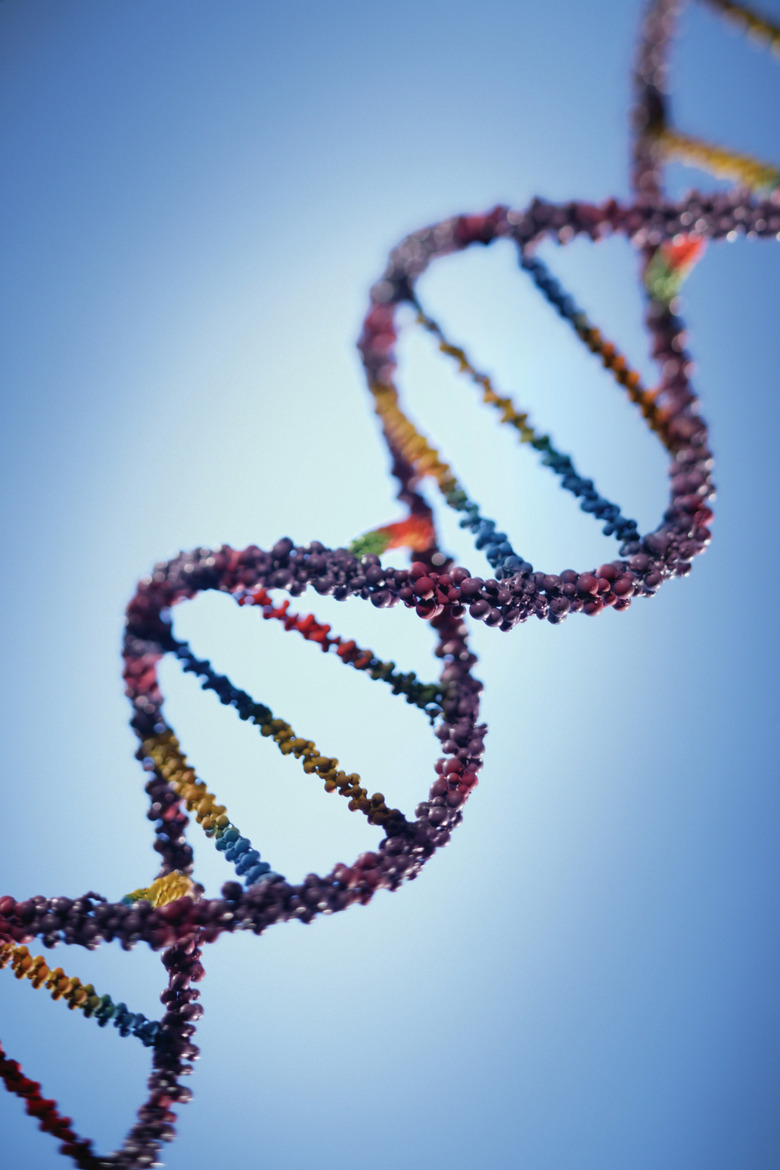How Does UV Light Damage The DNA Strand?
DNA may be the single most important molecule in biology. All living things, from bacteria to humans, have DNA in their cells. Both the form and the function of an organism are determined by instructions stored in the DNA. Every process in your body is controlled and directed by these instructions in a very precise way. Any damage to the DNA molecule, and therefore the instructions it contains, can lead to disease.
Structure
Structure
The information in DNA is determined by its structure. The DNA molecule is a long strand made up of smaller, simpler molecules linked together, like the links of a chain. Four different, though similar, molecules are used as links to make up the chain. The order in which these four molecules occur along the chain encodes the instructions. Although the information is very complex and detailed, only four different links are needed. The four small molecules that make up the links of the DNA strand's chain are called bases and include adenine, cytosine, guanine and thymine.
UV Light
UV Light
UV light, short for ultraviolet light, also known as ultraviolet radiation, is a form of invisible light that carries a lot of energy. This energy can damage DNA. UV is the component of sunlight that causes sunburns and suntans. It can also be created artificially, and is used in tanning beds and booths. The three types of UV light are UVA, UVB, and UVC. The highest energy, most damaging of these is UVC. Fortunately, the Earth's atmosphere blocks the UVC in sunlight before it reaches the surface. The lowest energy, least dangerous UVA does penetrate the atmosphere, but is not powerful enough to damage DNA directly. UVB rays both penetrate the atmosphere and possess enough energy to damage DNA.
Damage
Damage
UVA is not energetic enough to damage or alter DNA directly. It may help cause the formation of harmful oxygen radicals, however. Oxygen radicals can attack DNA directly, but can also alter fats and proteins in a way that makes them harmful to DNA. This damage is thought to be cancer-causing. The UVA used in indoor tanning booths and beds causes this type of damage, and increases the risk of skin cancer. UVA damage is cumulative, so more tanning means more risk. People who use indoor tanning are 75 percent more likely to develop skin cancer that those who do not.
When UVB light hits the DNA strand, it causes a change in the structure of the chain. Any place along the strand that has two thymine bases in a row is vulnerable to this damage. The energy of the UVB light alters a chemical bond in the thymine. The altered bond causes the neighboring thymine bases to stick to each other. This pair of stuck-together thymine molecules is called a dimer. Wherever these dimers are formed, the DNA strand is bent from its normal shape, and cannot be read properly by the cell. Every second a cell is exposed to the UVB in sunlight can cause the creation of up to 100 dimers. If a cell accumulates too many dimers, it can die or become cancerous.
Dimer Repair
Dimer Repair
Although the production of dimers on the DNA strand by UV light is common, the natural repair processes of the cell correct most of the distortion they cause quickly enough to avoid permanent damage. Proteins in the cell detect the damage and cut out the damaged section of the DNA strand that contains the dimers. The missing segment is then replaced with the correct bases and the damage is repaired. Although the natural repair mechanisms are very efficient, dimers can still accumulate, causing cell death or cancer.
References
- Nature: What is DNA
- Stanford at The Tech Museum: Understanding Genetics
- Nature: DNA Is a Structure That Encodes Biological Information
- United States Food and Drug Administration: Radiation-Emitting Products
- Nature: DNA Damage & Repair: Mechanisms for Maintaining Integrity DNA
- United States Food and Drug Administration: Know the Risks of Indoor Tanning
Cite This Article
MLA
Csanyi, Carolyn. "How Does UV Light Damage The DNA Strand?" sciencing.com, https://www.sciencing.com/uv-light-damage-dna-strand-12687/. 24 April 2017.
APA
Csanyi, Carolyn. (2017, April 24). How Does UV Light Damage The DNA Strand?. sciencing.com. Retrieved from https://www.sciencing.com/uv-light-damage-dna-strand-12687/
Chicago
Csanyi, Carolyn. How Does UV Light Damage The DNA Strand? last modified March 24, 2022. https://www.sciencing.com/uv-light-damage-dna-strand-12687/
